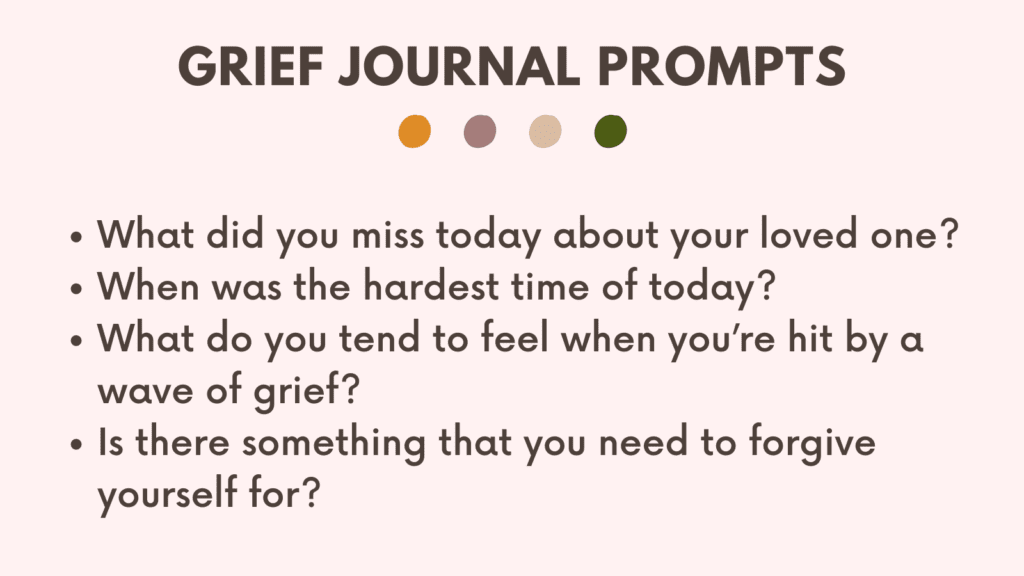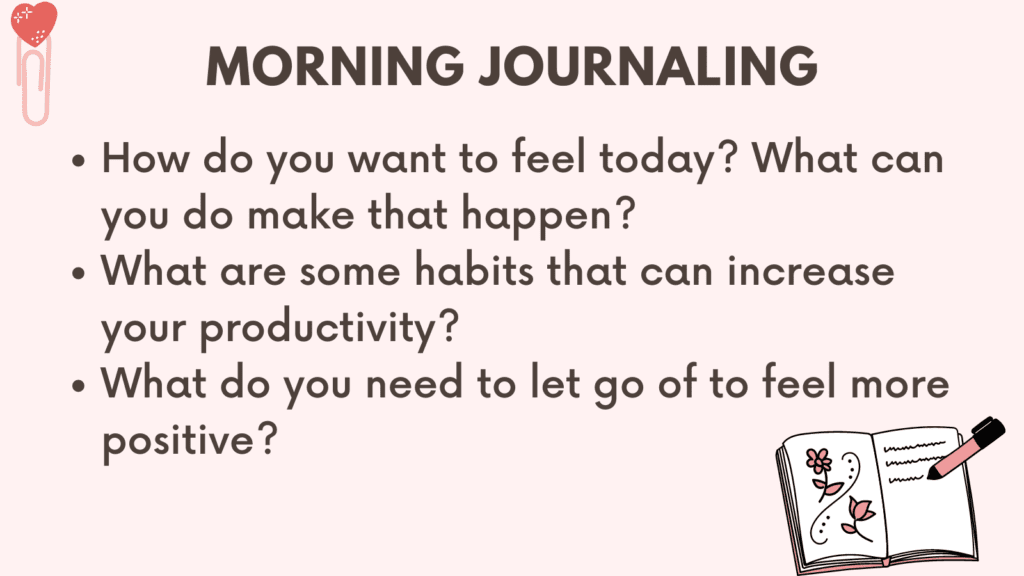This post contains grief journal prompts that will help you manage your emotions in healthy ways and cope.
What Are Journal Prompts?
Journaling prompts are questions or statements that can make it easier to reflect on a certain topic.
Why Journal?
Journaling can help you log your thoughts and feelings. This can be a cathartic and relieving experience.
Journaling can also help you review how far you’ve come, especially on days you feel like giving up.
Studies have shown that journaling can:
Related: Top +100 Journal Prompts For Mental Health [+Free PDF Printable!]
Grief Journal Prompts
If you aren’t sure where to start, the following grief journaling prompts can help:
1. What did you miss today about your loved one?
2. When was the hardest time of today?
3. What have you been feeling most of lately? Where did you feel it in your body?
4. What do you tend to feel when you’re hit by a wave of grief?
Related: How To Sit With Painful Emotions? (Top 9 Difficult Emotions)
5. What tends to trigger your feelings of grief? (events, holidays, songs, places, certain people, etc.)
6. What’s one comforting memory of your loved one you remember?
7. What’s one thing your loved one did or said that meant/means so much to you?
8. When do you feel most connected to your loved one?
9. How can you honor your loved one? Is there something you can do or give to celebrate their memory?
10. Is there something that you need to forgive your loved one for?
11. Is there something that you need to forgive yourself for?
12. When you felt overwhelmed with grief in the past, what helped you cope?
13. What can you do to take care of yourself when you feel overwhelmed by a difficult emotion?
14. What do you need to do more of or less of to show yourself compassion?
15. What do you need to remind yourself of to cope with difficult times? Write a mantra you can use when you feel overwhelmed by grief.
Related: Best 99 Coping Skills (+FREE Coping Worksheets)
16. Who can you turn to for support when you’re feeling overwhelmed? Do you feel comfortable asking for help? Why or why not?
17. What is something you wish your support system would understand?
18. Write a letter to your loved one.
19. Write a letter from your loved one to yourself.
20. In the absence of your loved one, what’s your biggest motivation?
21. What’s something you are still learning to accept?
Related: How To Heal A Grieving Heart? +30 Activities That Will Help You Navigate Grief
Alternative Journaling Ideas:
Remember, there is no right or wrong way to grieve.
If journaling is not something that resonates with you, here are some alternative journaling ideas:
- Drawing: if you feel more comfortable drawing or painting, you may use that to express your feelings.
- Making a collage: you can also cut words or picture from magazines and make a collage.
- Voice notes: use a recorder to record your daily thoughts. You may also record messages to your loved ones.
Free Printable Worksheets For Grief (PDF)
Benefits of Using Grief Journal Prompts
Using grief journal prompts has many benefits for individuals who are experiencing grief, including:
1. Helps with emotional processing: Journaling allows individuals to express and explore their emotions in a safe and private space. Writing about thoughts and feelings related to grief can help individuals process their emotions and work through the grieving process.
2. Reduces stress: Journaling has been shown to reduce levels of stress. Writing about difficult emotions can help individuals release tension and stress.
3. Provides a sense of control: During times of grief, individuals may feel like they have lost control over their lives. Writing in a journal can provide a sense of control over their emotions.
4. Enhances self-awareness: Grief journal prompts can help individuals reflect on their experiences and develop a deeper understanding of themselves.
5. Facilitates healing: Writing about grief can help individuals heal and move forward from their loss.
Related: Top 25 Self-Reflection Journal Prompts
How to Use Grief Journal Prompts?
Here are some steps on how to use them:
1. Set aside a dedicated time and space for journaling. This could be a few minutes each day or a longer session once a week. Find a quiet place where you won’t be interrupted.
2. Choose a prompt that resonates with you. There are many different grief journal prompts available online. It’s important to choose one that feels relevant and authentic to your experience.
3. Start writing without judgment. Write down whatever comes to mind, even if it doesn’t make sense or feels uncomfortable. Remember that this journal is for you and no one else, so there’s no need to worry about what others may think.
4. Reflect on your writing. After you’ve finished writing, take some time to reflect on what you’ve written. Ask yourself what insights you gained from the process.
5. Continue journaling on a regular basis. Journaling about grief is not a one-time event. It’s an ongoing process that can help you work through emotions and feelings over time. Make it a part of your regular self-care routine.
Related: Best 10 Self Discovery Books
Prolonged Grief Disorder
Studies show that 1 in 10 adults may experience prolonged grief (source)
The Statistical Manual of Mental Disorders, Fifth Edition, Text Revision (DSM-5-TR) added symptoms associated with prolonged grief disorder to its list of diagnostic criteria.
Prolonged grief disorder is now a formal diagnosis for those who have faced difficulty coping with loss for an extended period of time.
“I think these [clients] would generally get lumped into adjustment disorders or depression diagnoses,” said Karin Gepp, PsyD, a clinical psychologist in New York and Psych Central Advisory Board member, said in an email.
Diagnostic criteria
According to the DSM-5-TR, the diagnostic criteria for prolonged grief includes:
- A persistent grief response for more than 12 months (6 months for a child).
- Symptoms that significantly disrupt the person’s daily functioning.
- Experiences that can’t be attributed to another condition, such as major depressive disorder (MDD) or post-traumatic stress disorder (PTSD).
Related: Grieving Someone Who Is Still Alive – Ambiguous Grief
When to Seek Help?
There a lot of ways you can manage grief on your own, including journaling.
However, if grief starts to interfere with your life and daily functioning, you need to consider seeking professional help to navigate your healing journey.
Psychologist Locator and the National Register are two websites for locating psychologists in USA.
Grief & Loss Resources
Grief & Loss Support Groups – You Don’t Have To Grieve Alone
Grief in Common (griencommon.com) An online community of people who share similar losses
The National Mental Health Consumer’s Self-Help Clearinghouse (MHselfhelp.org) An inclusive online resource connecting patients, health care providers, advocates, and policymakers
Grief Anonymous (griefanonymous.com)
TED TALKS
We don’t “move on” from grief. We move forward with it from writer and podcaster Nora McInerny
The journey through loss and grief from author Jason B. Rosenthal
What makes life worth living in the face of death from author Lucy Kalanithi
PODCASTS
The Mindfulness & Grief Podcast (Apple/Spotify) hosted by author and thanatologist Heather Stang
Grief Out Loud (Apple/Spotify) hosted by Jana DeCristofaro
What’s Your Grief Podcast (Apple/Spotify) hosted by Eleanor Haley and Litsa Williams
Grief Encounters (Apple/Spotify) hosted by Venetia Quick and Sasha Hamrogue
Conclusion
Using grief journal prompts is a helpful way to cope with the emotions and feelings associated with loss.
Remember, grief journaling isn’t a substitute for therapy or professional help, but it can be a helpful tool to support your healing journey.

References
- Portions of this article were adapted from the book Diagnostic and Statistical Manual of Mental Disorders, Fifth Edition, Text Revision (DSM-5-TR), © 2013 by American Psychiatric Association. All rights reserved.
- Online Positive Affect Journaling in the Improvement of Mental Distress and Well-Being in General Medical Patients With Elevated Anxiety Symptoms: A Preliminary Randomized Controlled Trial – PMC (nih.gov)
- How Journaling Can Help You in Hard Times (berkeley.edu)
- What’s All This About Journaling? – The New York Times (nytimes.com)
- Journaling for Mental Health – Health Encyclopedia – University of Rochester Medical Center
- Benefits of Journaling for Mental Health (5 Science-Based Benefits of Journaling for Anxiety and Depression)) | Holstee
- The Mental Health Benefits of Journaling | Psych Central
- 83 Benefits of Journaling for Depression, Anxiety, and Stress (positivepsychology.com)
- Journaling isn’t just good for mental health. It might also help your physical health. (nbcnews.com)
- Benefits of Journaling: The Science and Philosophy Behind Keeping a Di – Intelligent Change



